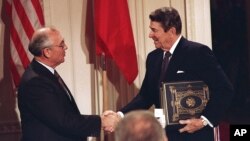The United States upped the diplomatic pressure this week by saying Russia has violated provisions of the Intermediate-Range Nuclear Forces treaty - or INF - a treaty considered to be the cornerstone of the U.S.-Russian nuclear disarmament structure.
This is a serious accusation, analysts say, and one that has roots dating back to the close of the Cold War.
The INF treaty was signed in December 1987 by U.S. President Ronald Reagan and his Soviet counterpart Mikhail Gorbachev. It entered into force in June 1988.
Daryl Kimball, head of the Arms Control Association, a private research firm, said it was a historic treaty because it eliminated an entire class of weapons.
“It required that the U.S. and the Soviet Union - now Russia - eliminate permanently and forswear all of their nuclear and conventional ground-based ballistic missiles and cruise missiles with ranges from 500 kilometers to 5,500 kilometers.”
By May 1991, all intermediate-range missiles were eliminated. Those included on the U.S. side the Pershing-2 and on the Soviet side, the SS-20.
[a total of 2,692 missiles were destroyed: 846 on the U.S. side and 1846 on the Soviet side]. The treaty also prohibited the production of such missiles.
But now White House spokesman Josh Earnest said the United States has determined that Russia has violated provisions of the INF treaty.
“The Russian Federation is in violation of that treaty and that treaty’s obligations not to possess, produce or flight test a ground-launched cruise missile with a range capability of 500 to 5,500 kilometers.”
Daryl Kimball is more specific.
“The treaty bars the testing of ground-based intermediate missiles or cruise missiles and the U.S. has determined that Russia has conducted tests involving ground-based cruise missiles that are prohibited by this treaty,” said Kimball. “The treaty does not prohibit sea-based cruise missiles. So theoretically, if Russia had conducted these tests at sea, it would not have been a violation.”
Kimball agreed with the Obama administration that Moscow has violated the INF Treaty.
“It’s serious, but it does not represent a military threat, a new military threat to the United States or its allies, because Russia is not deploying these ground-based nuclear armed cruise missiles in numbers, they are not deploying them at all.”
Kimball said it is not too late for Moscow to redress the situation.
“It can suspend any further tests involving ground-based cruise missiles prohibited by the treaty. It can destroy any of the ground-based launchers it used for these tests and that would likely address the non-compliance problem.”
Kimball said over the years Russia has threatened to withdraw from the INF treaty, increasingly concerned that countries such as China, North Korea, India and Pakistan have built up their intermediate-range nuclear weapons.
“There are some in Russia’s defense establishment who are itching to find ways to either get around or break out of the INF treaty so that Russia can counter these other kinds of short and medium-range ballistic missile opponents.”
There are others within the Russian government, said Kimball, who want to increase the membership of the INF treaty, bringing in new countries and in essence banning those missiles. Kimball said it will be interesting to see which direction Russia will take.






